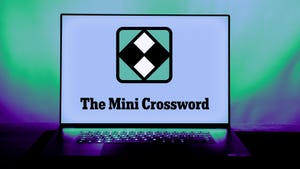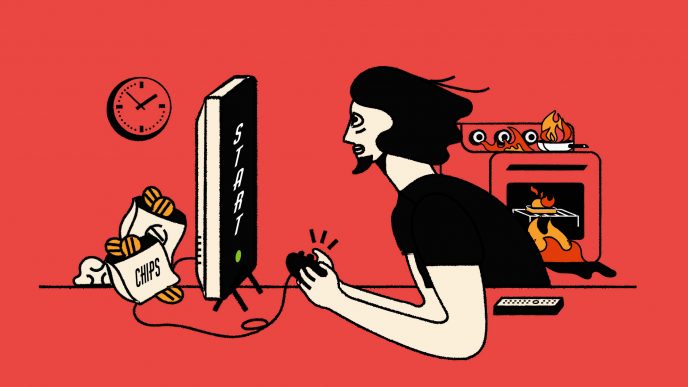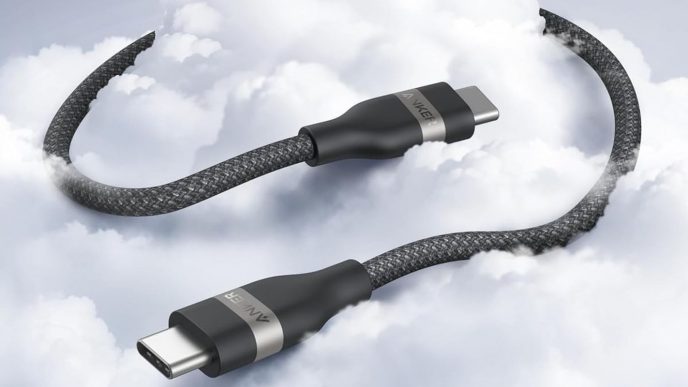If you’ve spent enough time scrolling through TikTok, you might have seen a video from an account like @tybuggyreviews, a handle with half a million followers that exclusively posts videos selling products through the TikTok Shop.
The creator, whose verified Instagram account identifies him as Tarik Garrett, used the @tybuggyreviews account to pitch viewers on supplements, water flossers, earbuds, workout machines, bible study guides, probiotics for women to help “that smell down there,” watch bands, inspirational hoodies, inspirational T-shirts, face massagers, foot massagers, rhinestone necklaces, oil pulling kits, and colon cleanses.
In the TikTok Shop, creators earn a commission for each sale linked to their account. Garrett’s product videos got tens of thousands of views. A few even topped a million views. But nothing from his account took off quite like his sales pitch for an obscure 2019 publication called The Lost Book of Herbal Remedies.
“Now I see why they’re trying to remove TikTok. This book right here? This book of herbal remedies? They do not want us to see this book,” Garrett said at the beginning of one Shop video, referring to a new US law that requires TikTok’s Chinese parent company to either sell the app or face a ban. TikTok is challenging the law in court, arguing that lawmakers citing national security concerns as a reason to pass the bill did not adequately argue why those concerns should supersede the First Amendment. The law, to be clear, does not cite the Lost Book of Herbal Remedies’s availability on the TikTok Shop as a reason for banning the platform.
Garrett posted his pitch for the book on April 15. As of May 7, the video had more than 16 million views. Garrett opened the book and showed pages of its recommendations, urging users to take screenshots (and purchase a copy of their own) before it’s too late.
The camera lingered on a list of plants that, the book claimed, were treatments for cancer, drug addiction, heart attacks, and herpes. As of Wednesday, the listing for The Lost Book of Herbal Remedies that Garrett linked to has more than 60,000 sales on the TikTok Shop. To put that number in perspective, appearing on a bestseller list generally requires 5,000–10,000 sales in a week.
And that interest isn’t staying exclusively on TikTok. Google search interest in the book’s title spiked on the same day Garrett posted his video. The Lost Book of Herbal Remedies was, as of Wednesday, May 8, ranked 10 on Amazon’s bestseller list for books, and has appeared toward the top of Amazon’s bestseller rankings for the past three weeks.
I sent a handful of Garrett’s videos advertising the book, along with about a half dozen additional widely viewed videos from other creators promoting The Lost Book of Herbal Remedies, to TikTok for comment. A spokesperson for TikTok said that videos linking to Shop products must abide by both the community guidelines, which ban medical misinformation, and Shop policies, which do not allow misleading content. If a video violates only the Shop policies, they said, they’ll simply remove the link to the Shop but keep the content up. If it violates community guidelines, the video comes down.
The violations were enough for TikTok to remove his product review account. Garrett did not respond to a series of emailed questions.
How e-commerce took over TikTok
TikTok has long been good at guessing what its users might want to see, but less good at monetizing that trick. When the platform launched its Shop feature in the United States last fall, the For You page shifted, pushing video after video like those made by @tybuggyreviews in the hope that its users will start buying the products that go viral on TikTok directly from their store.
The result became a For You page with constant interruptions from random product pitches. Right now, for instance, my For You page shows me a bunch of creators dancing to a German song about rhubarb, a bunch of pet birds behaving poorly, chaotic nonbinary people, and lots of ads from alternative wellness creators trying to sell me oils, mushrooms, and books.
The Shop ads I see, like much of the content pushed to me on TikTok, are personalized, though my TikTok Shop recommendations are heavily influenced by my reporting on stories like this one. Your results may differ. And yet, it is clear that TikTok has catapulted the Remedies book into relevance beyond a niche audience. The company earns money off of the explosion of sales on the shop, some of which come from creators who are explicitly promoting unproven cancer “cures” and conspiracy theories about the platform.
Like the Shadow Work Journal, a workbook that went super viral on TikTok Shop several months ago as a mental health tool — despite its dubious effectiveness — The Lost Book of Herbal Remedies is part of a swell of wellness creators, brands, and products that have found success reaching new audiences on TikTok Shop.
Shop videos have become a sort of “loophole” for health misinformation on TikTok, said Evan Thornburg, a bioethicist who posts on TikTok as @gaygtownbae and studies mis/disinformation and public health. Creators, and those with something to sell, know that Shop videos will get privileged on For You pages. Some creators may use those videos to promote dangerous health claims. In other cases, Thornburg noted, “the creator promoting the material isn’t necessarily spouting off disinformation, but the material that they’re convincing people to purchase is.”
A recipe for misinformation
The Lost Book of Herbal Remedies appears to be a case of both: The book contains misleading information, and creators are circulating misleading health claims in order to sell books. A video with nearly 1 million views promoting the book’s TikTok Shop listing is basically a series of ominous, AI-generated images with an AI voiceover. The video claims that the book contains secrets previously locked away in an ancient book located in the “Vatican library,” and that The Lost Book of Herbal Medicine was previously only available on the “dark web” before surfacing on TikTok. (Not true: The book is for sale on Amazon, the author’s website, and appears to be available through some academic and public library systems.) Another Shop video with more than 1 million views is captioned, “Cure for over 550 diseases, even cancer.”
I scanned through a copy of The Lost Book of Herbal Remedies this week. The 300-page book contains a disclaimer noting that it’s intended to “provide information about natural medicine, cures, and remedies that people have used in the past,” that it is not medical advice, and that some of the “remedies and cures found within do not comply with FDA guidelines.” It’s split into two parts: an alphabetical listing of ailments and conditions alongside the plants that the authors believe can cure or treat them, and an alphabetical list of plants, sorted by region, with instructions on how to prepare them.
The list of ailments the book includes proposed treatments for cancer, several STDs, mental health disorders, and digestive issues, among many other things. A few stand out: The book lists cures for smallpox, strep, and staph infections. There’s an emergency medicine section that includes plant remedies for serious medical conditions like internal bleeding and poisoning.
Flip to the entries for the plants and you’ll find lists of claims referring to research that is not cited. An entry promoting Ashwagandha’s “anti tumor effects” and ability to “kill … cancerous cells” refers to “research,” but does not note that, while there is some indication that Ashwagandha can slow the growth of cancer cells, these studies were conducted on rodents and have yet to be replicated on humans.
Nicole Apelian, one of the book’s authors, did not reply to an emailed request for comment. While active on TikTok, it’s not her main social media presence. Her TikTok bio encourages her 17,000 followers there to check her out on Instagram, where she has 100,000 followers. Apelain also runs Nicole’s Apothecary, an herbal shop mentioned in the book that sells some of the tinctures she recommends, sells memberships to an online “Academy” for fans of her book, and advertises her paid appearances and workshops.
The endless whack-a-mole
As a journalist, there’s a pattern that becomes evident when writing about health misinformation on social media: something gets views, you assess the real or potential harm and try to understand its context, you contact the company to ask about the harmful thing. Maybe the video or post or group is taken down, maybe it’s not. The company gives you a statement, refers you to their policies on misinformation, and then you publish the article. This happens over and over and over and over because writing about misleading health information is a game of whack-a-mole that feels harder and harder to win.
Thornburg, the bioethicist, noted a couple reasons why I can’t climb out of this purgatory. First, meaningful moderation of a platform like TikTok is somewhat implausible. Social media companies are “never going to prioritize the amount of labor that would need to consistently be put into misinformation management,” they said.
Most sites rely on a combination of human moderators and AI, and it’s difficult to create automated moderation tools that don’t also censor allowed content. For example: health misinformation targeting minority communities often taps into legitimate distrust of medical professionals and institutions that have roots in recent history. An AI tool designed to moderate keywords associated with this sort of targeted misinformation might also sweep up criticism of health care systems in general.
And second, the creators who profit off health misinformation are really good at figuring out what they can say where, and what Thornburg calls “life boating” their audiences from one platform to another as needed. “You will have people who will drive interest in something through TikTok because the virality and the algorithm are aggressive,” Thornburg said. Then, their profile will link out to their Instagram or Linktree or YouTube channel.
Health misinformation on social media is a million cross-pollinating moving targets. TikTok Shop is a hot spot right now. Later, it might be something else on another platform. Chasing this content from platform to platform, harm to harm, viral video to viral video, is exhausting. I am exhausted.
At the end of our interview, Thornburg shared the question that drives a lot of their work in this space, “Who do we consider accountable for these things that are harmful and regulate them or hold them to certain standards?” Often, it’s not really the person behind the individual piece of content driving the incentives for making it.
As a result of my reporting, Garrett’s account was taken down, along with a few other popular videos advertising a book that has already sold tens of thousands of copies. As long as the incentives remain, it won’t be long until the next product promising a miracle starts polluting my For You page.










